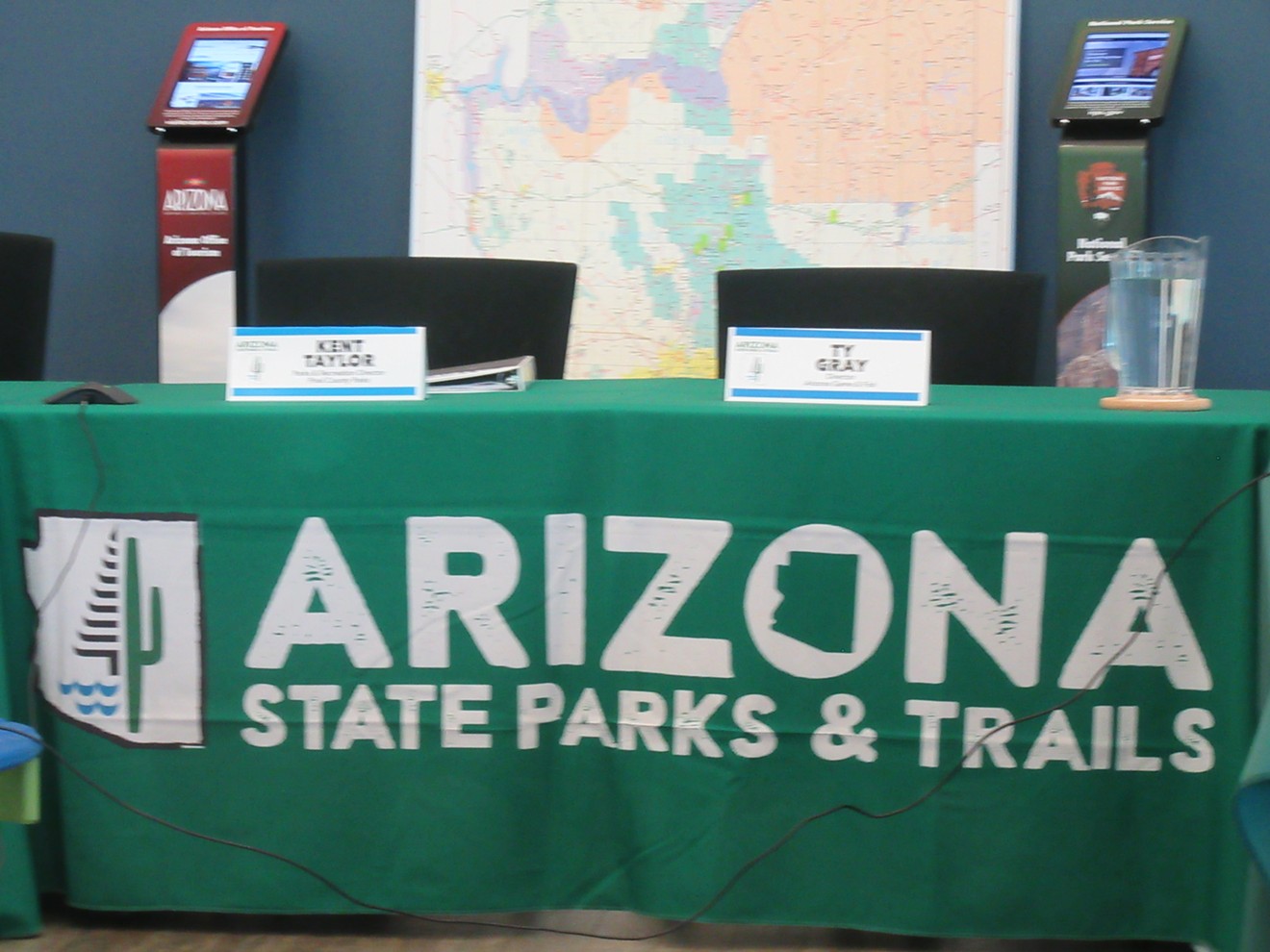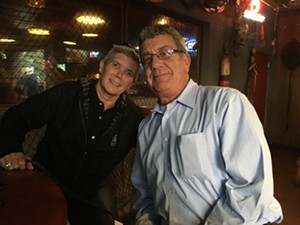Governor Doug Ducey’s administration concluded that Arizona State Parks failed to follow standard practices — but did not break any rules — when the agency took unusual steps to hire a ranger who had a prior relationship with former Director Sue Black.
Phoenix New Times first reported in October that Parks hired Sharie Holland, who allegedly dated the former director, as a seasonal park ranger without making her undergo a background check or physical examination. The Arizona Department of Administration launched an investigation one day after New Times emailed Parks spokesperson Michelle Thompson questions about Holland's hiring.
Holland, who was hired in May 2015, also received state-subsidized housing at Lake Havasu State Park, an unusual perk for a seasonal employee without special certification or law enforcement credentials.
An investigative report by ADOA confirmed several details in New Times' reporting, but found that none of those deviations from protocol broke any rules.
The disclosure follows a rocky year for Parks. Governor Ducey fired Black and former Parks Deputy Director James Keegan last month after New Times first reported allegations that they oversaw the illegal destruction of several archaeological sites. Attorney General Mark Brnovich opened a criminal investigation into the matter.
The criminal probe and firings followed a monthslong investigation by ADOA over multiple allegations of wrongdoing at the department, ranging from bullying to procurement violations. On October 18, ADOA spokesperson Megan Rose said the agency had finished a draft based on the investigation was still under legal review.
The draft, it turns out, consists of hand-written notes taken by three investigators that do not reach any conclusions on the allegations. Rose told New Times on Friday that the agency does not plan to issue a formal report based on its investigation.
A seven-page summary report on Holland's hiring was the only complete report released to New Times on Thursday. ADOA redacted several names and allegations, but New Times has enough information to fill in some of the blanks. The author of the report, Fred Burk, declined to comment.
The report covers allegations of retaliation and favoritism.
Let's start with favoritism, which was the primary allegation in New Times' October story.
Shawn Schmidt, a former close friend of Black, told New Times in October that Black said she and Holland once had a romantic relationship. Schmidt said he lived with Black for a few months in 2015, during which time he hung out with Black and Holland together on multiple occasions.
The ADOA report confirms that Black and Holland knew each other, but does not say whether they dated. According to the report, Black told investigators she lived with Holland “a couple times” including a “few months” in the 1980s while Holland was having a house built.
Black said the two met through mutual friends but had not kept in touch, contradicting the claim by Schmidt that he socialized with both of them prior to Holland’s hiring. Furthermore, Holland confirmed that she lived with Black.
The report gives conflicting statements on whether Black encouraged Holland to apply for the job. Holland told investigators she did. Black claimed she didn't. Keegan, who hired Holland, claimed to ADOA that he did not know Black and Holland had a prior relationship. Keegan also claimed Black did not instruct him to hire Holland.
What is clear is that after Holland applied for the job, she received a leg up on other prospective hires.
The report reveals that Holland actually applied for a marketing position in Phoenix, rather than the ranger position at Lake Havasu that she ultimately accepted. Keegan claimed to ADOA that the agency hired Holland through the marketing position because they needed someone immediately and that there were no Lake Havasu positions open at the time. In fact, ADOA found, there were two park ranger positions open at Lake Havasu at the time.
It was unusual for Holland to be hired as a ranger through Parks' central Phoenix office. Seasonal rangers are typically hired by individual park managers. Of 30 employees hired between April 6, 2017, and June 28, 2017, Holland was the only seasonal hire interviewed in Phoenix for a field position, the report found.
Holland did not undergo a required physical examination prior to her job offer. Keegan claimed that Holland was exempted from the physical because the job would mostly consist of office work. According to the report, someone identified as Holland's direct supervisor told ADOA that most of Holland's work was in the field.
A former senior employee involved with Holland's hiring dismissed Keegan's explanation for skipping the physical.
"Her not having a physical when she is entering into a physical position was not appropriate and allowed for the agency to be put in a position of risk and liability because of a personal decision," said the former employee, who requested anonymity due to the ongoing criminal investigation of Parks.
The former employee alleged in the New Times story that Keegan also instructed staff to hire Holland without subjecting her to a standard background check, a claim the ADOA report does not address.
ADOA investigated an additional claim that Parks arranged for Holland to live in state-subsidized housing contrary to standard practice. As New Times reported, Holland was offered one of the on-site ranger housing units at Lake Havasu State Park as a seasonal employee, despite the agency earlier turning down a full-time ranger for the spot. Housing is typically reserved as well for law enforcement officers or employees with special certifications, neither of which apply to Holland.
New Times reported in October that Holland's housing assignment contributed to a decline in morale among Lake Havasu employees.
Black told ADOA she had no knowledge of Holland receiving housing. The former employee involved in Holland's hiring told New Times on Thursday that's not true, saying all housing assignments were approved by the director.
The report also covers a claim from former Lake Havasu State Park Assistant Manager Stephen Chruisciel that he was denied a promotion to park manager in retaliation to a report he wrote alleging Holland smoked marijuana in her state-subsidized housing unit, in violation of Parks policy and state law.
New Times in October reviewed a memo written by Chruisciel in which he recounts smelling an odor consistent with the smell of marijuana in Holland's housing unit. The memo was sent to several Parks senior managers.
Chrusciel told ADOA that he spoke with both Black and Keegan about the allegation and that Keegan asked him to drop it.
The ADOA report does not appear to make a conclusion on the retaliation claim.
Clarification: This story has been updated to reflect that ADOA does not plan to issue a formal report based on a monthslong investigation it conducted at Parks in which employees made several allegations of wrongdoing. A spokesperson for ADOA told New Times in October that the department completed a draft of the investigation that was under legal review. That draft turns out to be more than 100 pages of inconclusive handwritten notes.
[
{
"name": "Air - MediumRectangle - Inline Content - Mobile Display Size",
"component": "18478561",
"insertPoint": "2",
"requiredCountToDisplay": "2"
},{
"name": "Editor Picks",
"component": "16759093",
"insertPoint": "4",
"requiredCountToDisplay": "1"
},{
"name": "Inline Links",
"component": "17980324",
"insertPoint": "8th",
"startingPoint": 8,
"requiredCountToDisplay": "7",
"maxInsertions": 25
},{
"name": "Air - MediumRectangle - Combo - Inline Content",
"component": "16759092",
"insertPoint": "8th",
"startingPoint": 8,
"requiredCountToDisplay": "7",
"maxInsertions": 25
},{
"name": "Inline Links",
"component": "17980324",
"insertPoint": "8th",
"startingPoint": 12,
"requiredCountToDisplay": "11",
"maxInsertions": 24
},{
"name": "Air - Leaderboard Tower - Combo - Inline Content",
"component": "16759094",
"insertPoint": "8th",
"startingPoint": 12,
"requiredCountToDisplay": "11",
"maxInsertions": 24
}
]












